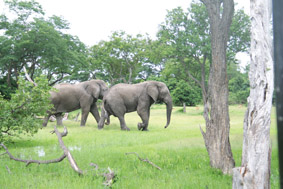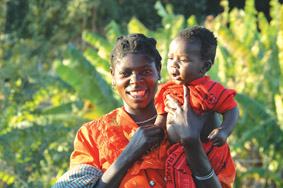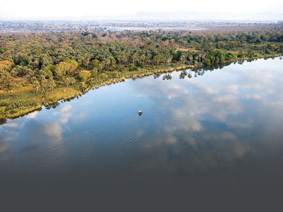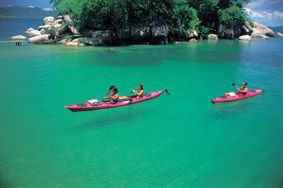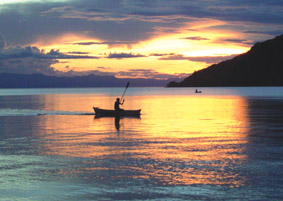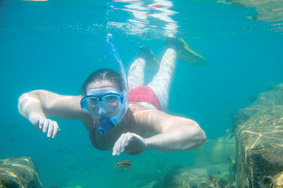|
|
|
|
|

WARM HEART OF AFRICA
Capital: Lilongwe.
Climate: Subtropical.
Rainy season November to May; dry season May to
November. Maximum average temperature in southern lake region varies
from 21°C in June and July to 27°C in October to March.
Currency: The
Malawian kwacha (MWK) is divided into 100 tambala.
Elevations: Lowest
point is junction of the Shire River and international boundary with
Mozambique at 37 metres above sea level. Highest point is Sapitwa
(Mount Mlanje) at 3,002 metres.
Ethnic groups: Chewa,
Nyanja, Tumbuka, Yao, Lomwe, Sena, Tonga, Ngoni, Ngonde, Asian,
European.
History: Established
in 1891, the British protectorate of Nyasaland became the
independent nation of Malawi in 1964.
Industries: Tobacco,
tea, sugar, sawmill products, cement, consumer goods, mining
minerals such as uranium, coal and rare metals.
Geography: Malawi
is landlocked. Lake Malawi, 580 km long, is the most prominent
physical feature.
Languages: English
is the official language, Chichewa is the national language. Other
widely spoken languages are Tumbuka, Yao, Lomwe and Sena.
Population: 13.2
million (2008 census)
Religions: Christian
80 per cent, Muslim 13 per cent, other 3 per cent, none 4 per cent
(1998 census).
So much more to see and do in the Warm
Heart of Africa
WELCOME to Malawi, the warm heart of Africa. In many
ways, it is also the genuinely friendly, safe and
undiscovered heart of Africa – an almost off-the-radar,
small and exclusive destination that is just that little
bit different from its better-known neighbours.
It’s a place where tourists seem to be
travelers. Typically, they are visitors who already know
Africa but now seek a more varied and altogether broader
experience. In fact, Malawi’s unique selling point is
the sheer variety of things to see and do in a
comparatively confined area – with more in the
pipeline.
Although Malawi has no lack of reasonably priced game
parks and reserves (there are nine, in fact) with a wide
range of species, climates and topographies as well as
great birdwatching, the country does not consider itself
an out-and-out wildlife viewing safari destination. It
is certainly not the principal reason why visitors come.
Nevertheless, Malawi’s parks are growing in popularity –
as the number of newly built camps and smart lodges will
testify – and overall animal and visitor numbers are
increasing as a result of efforts by the Department of
National Parks & Wildlife and those working closely with
the DNPW.
Perhaps like no other nation, Malawi is dominated by a
lake. In fact, Lake Malawi, the third-largest in Africa,
covers an impressive 20 per cent of the country’s total
surface area. It is thought to contain more species of
fish – many of them endemic – than any other body of
water on Earth.
ATTRACTIONS
The main attractions of Lake Malawi
are its discreet island hideaway properties, its
surprisingly classy lakeside lodges, and the great
opportunities to dive, snorkel, kayak, sail and swim in
its delightfully warm and crystal-clear waters. Away
from the lake, visitors are attracted by walking and
climbing – especially in the Mulanje Massif, with its
soaring peaks of up to 3,000 metres, where climbers will
find excellent facilities including a team of willing
porters. Visitors can also go horse riding (even within
Nyika National Park) and mountain biking.
The Shire Highlands area around Mulanje is at the heart
of Malawi’s famous tea-growing region. Both Mulange and
Thyolo have tea plantations featuring restored colonial
estate houses where guests are treated to old-style
service and delicious home cooking.
Then there is the cultural life, which has a higher
profile in Malawi than in many other African
destinations. Most itineraries drawn up by tour
operators will include some aspect of the local culture
– the cuisine, the ceremonies and the lifestyle – with
opportunities to interact with local people.
In terms of getting around, the national road network
has been greatly improved. Journey times have been
shortened between Lake Malawi and both Lilongwe and
Blantyre as well as to and from the main parks and
reserves. This has made itinerary planning more certain,
allowing tour operators to intensify trips in terms of
what to see and do.
Nevertheless, getting to Malawi remains a little
complicated because there are no direct flights from
either Lilongwe or Blantyre to Europe or other
destinations beyond Africa. Most visitors will be routed
via Africa’s two main airport hubs, Nairobi and
Johannesburg.
Lilongwe and Blantyre, the commercial centre of Malawi,
are both easy to get around. The newly developed area of
Lilongwe, just north of the Old Town, has been
thoughtfully laid out and will soon boast the country’s
first five-star hotel, now under construction alongside
the recently completed and imposing new parliament
building. Blantyre also has many fine hotels, geared
largely to business visitors.
Whether one is arriving as a tourist or travelling on
business, Malawi is a place that visitors always want to
return to; and for those posted to Malawi from overseas,
it is a place they don’t ever seem to want to leave.
|
|
Lake Malawi "Lake of a thousand shinning Stars" |
Stunning views, excellent diving and fun
sailing trips – Lake Malawi has it all
Lake Malawi is one of several impressive lakes that run more
or less the length of the Great Rift Valley. It is Africa’s
third-largest lake (after Lake Victoria and Lake Tanganyika)
as well as being the second-deepest in Africa and the
eighth-largest in the world.
The lake stretches for over 580 km from north to south and
is 75 km across at its widest point. Occupying about 20 per
cent of the total surface area of Malawi, the lake covers an
area of 29,600 sq km, most of which is located within the
State of Malawi.
LIVELIHOOD
Lake Malawi dominates life across much of the country and
provides a livelihood for many Malawians. It is a bountiful
supplier of fish, with trawlers of up to 17.5 metres in
length working its waters, while many small boats also go
out each day in search of fish from villages along the lake.
The lake contains more species of fish than any other
comparable body of water on Earth.
Dotted along the western shore is an assortment of small
resorts as well as the occasional campsite or isolated
lodge. These stretch from Karonga in the far north, close to
the Tanzania border, to the Sunbird Nkopola Lodge (venue for
the annual Lake of Stars event) in the south and beyond to
the Nkopola Leisure Centre & Campsite just before Mangochi.
With soft, sandy beaches lapped by the tropical waters of
the lake and shaded by majestic palms, these properties
could easily be at the ocean’s edge rather than on an inland
sea. Other hideaway lodges are perched on small islands out
in the lake that can only reached by boat or canoe.
As well as lazing on Lake Malawi’s idyllic beaches or
secreting themselves away on a rocky island, visitors can
enjoy the lake to its fullest. Thanks to the huge array of
species in this freshwater lake, the snorkelling and diving
is virtually without equal in Africa. Visitors can also go
sailing, either in small boats or even overnighting in a
large catamaran.
NATIONAL PARK
The lake has its own national park, covering just 94 sq km,
in a stunningly beautiful location at Cape Maclear. The park
was created to protect the lake’s endemic fish species and
is Malawi’s only Unesco World Heritage Site. This area was a
favourite with the explorer David Livingstone and the graves
of five early European missionaries can be found in the
park.
For those with some time on their hands, one of the truly
delightful and mildly adventurous ways to see the lake is to
take a trip on the venerable 1949-built ferry ‘Ilala’. The
vessel leaves Monkey Bay in the far south of lake each
Friday at 10.00 and heads north, making 11 stops (including
two in Mozambique) before returning to Monkey Bay the
following Wednesday. The ferry has two grades of cabins and
is truly an experience to enjoy and savour. Passengers can
choose to buy voyage segments from the vessel’s regular
round-trip itinerary rather than staying on board for the
full six-day trip.
|
For more information, please contact:
Malawi Department of Tourism
Ministry of Tourism, Wildlife & Culture
Tourism House, Off Convention Drive
Private Bag 326, Lilongwe 3
Tel: +265 1 775 499; 772 702
Fax: +265 1 775 4943
Email: info@visitmalawi.mw
www.visitmalawi.mw
ETHIOPIAN AIR AND MALAWI GOVERNMENT CREATE
MALAWIAN AIRLINES
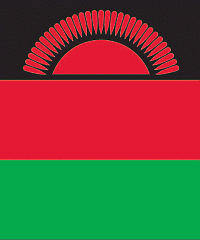
BY DR. WOLFGANG H. THOME, ETN CORRESPONDENT, AFRICA | JUL 09, 2013
(eTN) - The government of Malawi and Ethiopian Airlines finalized
the creation of a new national airline in the Southern African
country, called Malawian Airlines.
According to information from Addis Ababa, the government of Malawi
holds 51% of the shares in new carrier, and Ethiopian Airlines holds
49%.
Negotiations had been ongoing for a while and, as previously
reported, Malawi’s government sought a strategic investor after the
financial collapse of Air Malawi, to creatate professionally managed
new national airline supported by a strong partner. After ASKY in
West Africa, Malawian Airlines will be the second such joint
venture, as Ethiopian seeks to assert their continental leadership
through both direct expansion across Africa and through strategic
partnerships, which can help feed extra traffic into ET’s long haul
network and in turn benefit from ‘de-feeding’ Ethiopian’s traffic to
the respective countries into the near region.
Welcome to
Malawi
The Warm Heart of Africa is
beating faster now and the legendary welcome is there for
all who wish to experience the unrivalled combination of
Lake, Landscape and Wildlife in one of Africa's most
beautiful countries. Malawi is like none other in Africa:
small, yet with an immense diversitry of scenery and a vast
inland sea.
By using the side
navigation bar, you will be able to find out about Malawi's
numerous attractions, as well as details of places to stay
and things to do. The site is still being
developed.
If you have any queries, or
would like a comprehensive, FREE tourism information pack on
Malawi sent to you by post, please contact our Tourism
Information Office in the UK:
Tel: +44 (0)115 982
1903
Fax: +44 (0)115 981
9418
http://www.malawitourism.com/
Email:
mail@malawitourism.com
Mailing Address:
c/o Geo Group &
Associates, 4 Christian Fields, London, SW16 3JZ
MALAWI CROWNED AS RUNNER UP IN THE SAFARI
AWARDS "BEST AFRICAN TOURIST BOARD"
After the most successful year for tourism in the country's
history,
Malawi has been crowned runner-up in the 2013 Safari Awards
"Best
Africa Tourist Board" category - beaten only by Kenya who boast
a
marketing budget 40o times greater than that of Malawi.
For further information on Malawi Tourism
Contact Kelly White on 44 (0)1159727250
|




